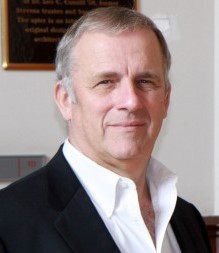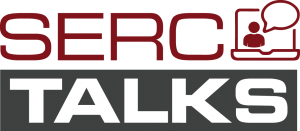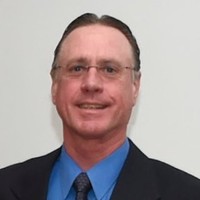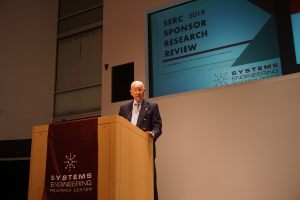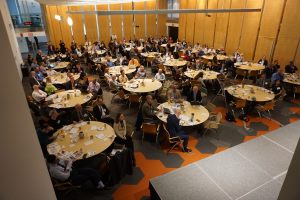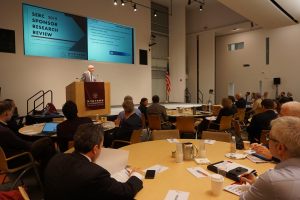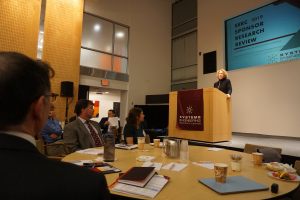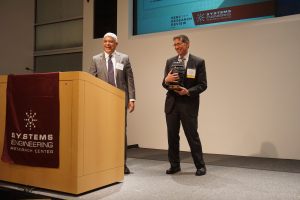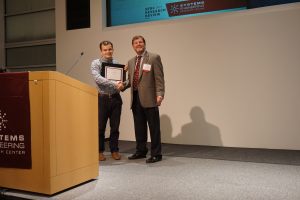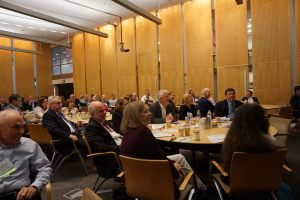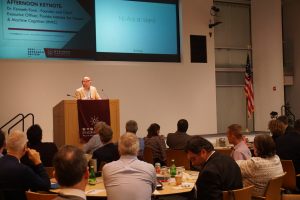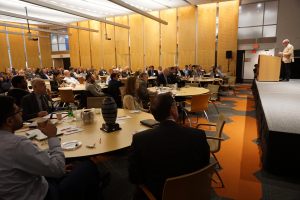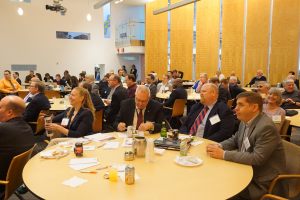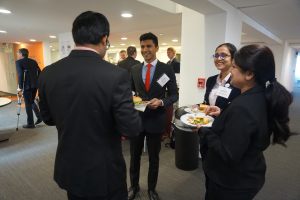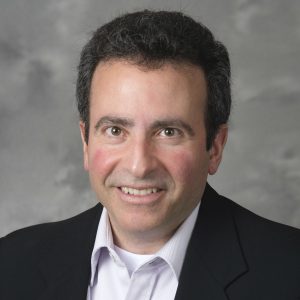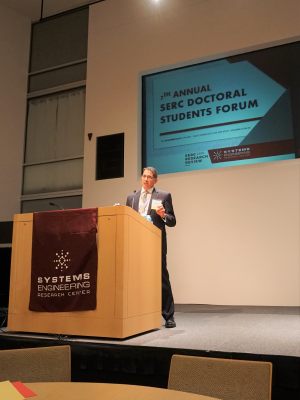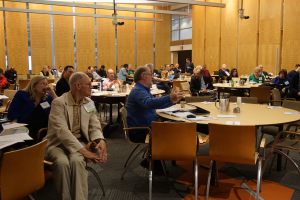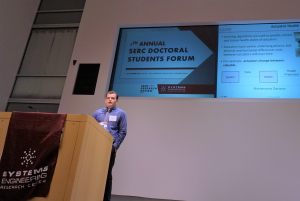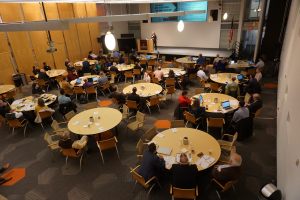SERC TALKS: “How Can We Systems Engineer Trust into Increasingly Autonomous Cyber-Physical Systems?”
NOTE TO PARTICIPANTS:
SERC Talks broadcasts using the Zoom Webinar Platform. Prior to the SERC Talk, we encourage all participants to install and test the platform to exercise full virtual capabilities. Installation is NOT required to join the session, as Zoom is accessible via web browser.
Zoom Installation | Zoom Web Client | Troubleshooting Guide
More information on future SERC Talks can be found here. Thank you!
SERC TALKS: “How Can System Architecture and Cost Models be Integrated for UAS Tradespace Analysis?”
Speaker: Dr. Raymond J Madachy, Professor of Systems Engineering, Naval Postgraduate School | CONTACT
Cost models have been extended for integration with formal Model-Based Systems Engineering (MBSE) methods including SysML, Orthogonal Variability Modeling (OVM), discrete event simulation, and system behavioral modeling with Monterey Phoenix (MP). Relevant case studies for small UAS are continuing as the methods are being refined. Existing models were applied to demonstrate tradeoff analyses, and new models were created to better represent actual conditions empirically observed in practice.
The talk will overview the modeling methods and their interfaces, case studies applied to single system architectures, and current investigations with UAS domain reference architectures developed by AFIT.
Dr. Madachy is currently on sabbatical as a Visiting Professor at the Air Force Institute of Technology. He is learning and conducting research in Unmanned Aerial Systems, flight testing and autonomy.
His books include Software Process Dynamics, co-authoring Software Cost Estimation with COCOMO II, Software Cost Estimation Metrics Manual for Defense Systems, What Every Engineer Should Know about Modeling and Simulation, and is currently writing Systems Engineering Principles for Software Engineers.
11th Annual SERC Sponsor Research Review (SSRR)
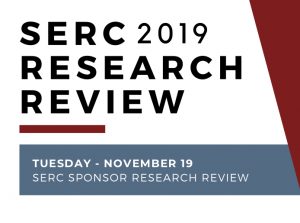
Tuesday, November 19, 2019
8:00 am – 5:30 pm
FHI 360 Conference Center
1825 Connecticut Avenue, NW, 8th Floor
Washington, DC 20009
The SERC Sponsor Research Review unites the government, industry, and academic systems engineering research community in order to share research progress and discuss the most challenging systems engineering issues today. In our two-day event, of which the SERC Sponsor Research Review spans the second day, the review highlighted over twenty ongoing SERC research projects including our most recent incubator projects. Researchers from the SERC universities discussed their research, highlighted results, and described opportunities for government agencies to sponsor and/or participate in their projects. Several of these research projects are ready for pilot use and transition to practice.
This year’s SERC Founders Award was bestowed upon a true champion of SERC and systems engineering, Scott Lucero, Acting Director, Engineering Policy and Systems, OUSD (R&E) and long-standing SERC Program Manager. Many thanks again, Mr. Lucero, for your incredible leadership and ongoing efforts to advance the field of systems engineering. Congratulations to this year’s winner of the SERC Doctoral Student Forum (SDSF) 2019 Best Student Presentation award, Tyler Cody from the University of Virginia for his research on “A Systems Theoretic Approach to the Design of Systems with Learning Algorithms.”
Attendance is open to government, Federally Funded Research Development Centers (FFRDCs), national laboratories, industry, and academic institutions. Events are free to SERC Collaborators and Government participants; members of non-SERC Universities, FFRDCs, National Laboratories and Industry attendees are charged a nominal fee.
For more event information, please contact Ms. Monica Brito.
Expand the track listings below to view presentations inline/in box:
SESSION 1 | 11:15 – 11:50 AM:
- “Identifying and Measuring Modularity Violations in Cyber-Physical Systems” – Dr. Lu Xiao and Dr. Michael Pennock, Stevens Institute of Technology
SESSION 2 | 11:55 AM – 12:30 PM:
- “Global Positioning Systems – Mission Engineering and Integration of Emerging Technologies” – Dr. Michael Orosz, University of Southern California
SESSION 3 | 1:45 – 2:20 PM:
Incubator Project Presentations: Velocity and Human Capital Development
- “Verification & Validation (V&V) / Test & Evaluation (T&E) Competencies” – Dr. Laura Freeman, Virginia Tech
- “Models for Efficient Testing (MET)” – Dr. Ye Yang, Stevens Institute of Technology
SESSION 4 | 2:25 – 3:00 PM:
- “System Design as a Mechanism for Generalization” – Tyler Cody, University of Virginia
SESSION 5 | 3:05 – 3:40 PM:
- “Systems Qualities Ontology, Tradespace and Affordability” – Dr. Barry Boehm, University of Southern California
SESSION 6 | 3:45 – 4:20 PM:
- “RT-206: Data science approaches to prevent failures in systems engineering” – Dr. Bruno Ribeiro, University of Southern California
SESSION 1 | 11:15 – 11:50 AM:
- “Digital Engineering Metrics” – Tom McDermott, Stevens Institute of Technology
SESSION 2 | 11:55 AM – 12:30 PM:
- “Systems Engineering Transformation Surrogate Pilot Experiments: Doing Everything in Models to Demonstrate the Art-of-the-Possible” – Dr. Mark Blackburn, Stevens Institute of Technology
- DOWNLOAD PRESENTATION | VIEW PROJECT: (NAVAIR | CCDC) | CONTACT
SESSION 3 | 1:45 – 2:20 PM:
- “Model Curation Implementation & Innovation (WRT-1009)” – Dr. Donna H. Rhodes, Massachusetts Institute of Technology
SESSION 1 | 11:15 – 11:50 AM:
- “Cyber Security Requirements Methodology: Tools & Transition” – Dr. Peter Beling and Dr. Tim Sherburne, University of Virginia
SESSION 2 | 11:55 AM – 12:30 PM:
- “Systemic Security and the Role of Hierarchical Design in Cyber-Physical Systems” – Dr. Valerie Sitterle, Georgia Tech
SESSION 3 | 1:45 – 2:20 PM:
- “Formal Methods in Resilient Systems Design using a Flexible Contract Approach” – Dr. Azad Madni, University of Southern California
SESSION 4 | 2:25 – 3:00 PM:
- “Methods to Evaluate Cost/Technical Risk and Opportunity Decisions for Security Assurance in Design” – Tom McDermott, Stevens Institute of Technology
SESSION 5 | 3:05 – 3:40 PM:
- “Game-theoretic Risk Assessment for Distributed Systems (GRADS)” – Dr. Paul T. Grogan, Stevens Institute of Technology
SESSION 6 | 3:45 – 4:20 PM:
- “Risk-based Approach to Cyber Vulnerability Assessment using Static Analysis” – Dr. Barry Horowitz and Tim Sherburne, University of Virginia
SESSION 1 | 11:15 – 11:50 AM:
- “Capstone Marketplace Update – Fall 2019” – CAPT William M. Shepherd, Stevens Institute of Technology
SESSION 2 | 11:55 AM – 12:30 PM:
- “WRT 1006: Digital Engineering Competency Framework” – Dr. Jon Wade, Stevens Institute of Technology
SESSION 3 | 1:45 – 2:20 PM:
- “Update on the HELIX project: Understanding organizational attributes that make systems engineering organizations effective” – Dr. Pam Burke, Stevens Institute of Technology
SESSION 1 | 2:25 – 3:00 PM:
- “Meshing Capability and Threat-based Science & Technology Resource Allocation” – Dr. Carlo Lipizzi, Stevens Institute of Technology
SESSION 2 | 3:05 – 3:40 PM:
Incubator Project Presentations: AI & Autonomy
- “Architecting Digital Twins for Model-Centric Engineering: Semantic and Machine Learning Approach” – Dr. Mark Austin, University of Maryland
- “Validation for AI and Autonomous Systems” – Dr. Valerie Sitterle, Georgia Tech; Dr. Paul Collopy, University of Alabama in Huntsville; and Ms. Jennifer Petrillo, University of Alabama in Huntsville
- “WRT-1011: Fostering human learning from cognitive assistants for design space exploration” – Dr. Daniel Selva and Gabriel Apaza, Texas A&M University
SESSION 3 | 3:45 – 4:20 PM:
- “Next Generation Adaptive Cyber-Physical-Human Systems” – Dr. Azad Madni, University of Southern California
SESSION 1 | 2:25 – 3:00 PM:
- “SE Business & Analytics” – Dr. K.P. (Suba) Subbalakshmi, Stevens Institute of Technology
SESSION 2 | 3:05 – 3:40 PM:
- “Approaches to Achieve Benefits of Modularity in Defense Acquisition (WRT-1002)” – Dr. Cesare Guariniello, Purdue University
SESSION 3 | 3:45 – 4:20 PM:
Incubator Project Presentations: Mission Engineering
- “Ecology-Inspired Technique for Resilient Engineered System of Systems Design” – Dr. Richard Malak, Texas A&M University
- “Explaining Model Composability using Causal Graphs” – Dr. Michael Pennock, Stevens Institute of Technology
- “Quantifying Mission Impact for Technology Alternatives” – Dr. Eric Weisel, Old Dominion University
Featured Speakers
Dr. Sandra H. Magnus
Deputy Director for Engineering within the Office of the Under Secretary of Defense for Research and Engineering
Dr. Sandra H. “Sandy” Magnus is the Deputy Director for Engineering within the Office of the Under Secretary of Defense for Research and Engineering. She serves as the DoD’s Chief Engineer for Advanced Capabilities. In this role, she is the lead for engineering policy, practice, and the DoD engineering workforce, as well as digital engineering and systems of systems engineering initiatives. She leads mission integration management, independent technical risk assessments, and program planning and execution.
Dr. Magnus is a recipient of the NASA Space Flight Medal and the NASA Exceptional Service Medal, among other awards.
Dr. Magnus received a bachelor of science in physics and a master of science in electrical engineering from the Missouri University of Science and Technology. She received a Ph.D. in engineering from the School of Materials Science and Engineering at Georgia Institute of Technology in 1996.
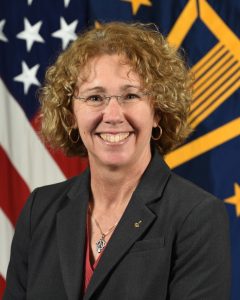
Dr. Kenneth M. Ford
Founder and Chief Executive Officer, Florida Institute for Human & Machine Cognition (IHMC)
Kenneth Ford is Founder and Chief Executive Officer of the Florida Institute for Human & Machine Cognition (IHMC) — a not-for-profit research institute located in Pensacola, Florida. IHMC has grown into one of the nation’s premier research organizations with world-class scientists and engineers investigating a broad range of topics related to building technological systems aimed at amplifying and extending human cognition, perception, locomotion and resilience. Richard Florida has described IHMC as “a new model for interdisciplinary research institutes that strive to be both entrepreneurial and academic, firmly grounded and inspiringly ambitious.” IHMC headquarters are in Pensacola with a branch research facility in Ocala, Florida.
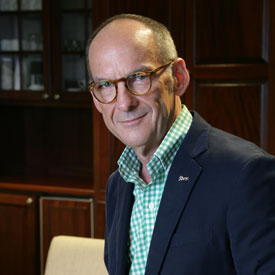
MODERATOR: Dr. Daniel A. DeLaurentis
Chief Scientist, Systems Engineering Research Center | SERC Research Council Member – (ESOS) | Professor, School of Aeronautics & Astronautics and Director, Institute for Global Security and Defense Innovation (i-GSDI), Discovery Park at Purdue University
Dr. Daniel DeLaurentis serves as the Chief Scientist of the Systems Engineering Research Center (SERC), assuming the role from Dr. Barry Boehm, Chair of the SERC Research Council. Dr. DeLaurentis is co-lead of the Enterprises as Systems and System of Systems (ESOS)Research Area as a member of the SERC Research Council, in addition to leading a project to develop an Analytical Workbench for system of system (SoS) architecture analysis, design and evolution. In addition to the SERC, he leads research projects with the Missile Defense Agency and NASA in developing agent-based modeling and simulation and associated design tools for development of advanced battle management (MDA) and air transportation (NASA) architectures. Dr. Daniel DeLaurentis is a Professor in Purdue’s School of Aeronautics & Astronautics. Dr. DeLaurentis also serves as the Director of Purdue’s Institute for Global Security and Defense Innovation (i-GSDI) in the University’s Discovery Park.
His primary research interests are in the areas of problem formulation, modeling and simulation, and robust system design and control methods for aerospace systems and systems-of-systems (SoS). This includes agent-based modeling, network theory, optimization, and aerospace vehicle modeling. His research is conducted under grants from NASA, FAA, Navy, the Missile Defense Agency as well as the Systems Engineering Research Center.
Dr. DeLaurentis is an Associate Fellow of the American Institute of Aeronautics and Astronautics and served as Chairman of the AIAA’s Air Transportation Systems (ATS) Technical Committee from 2008-2010. He is also AIAA’s Deputy Strategic Technologies Coordinator since 2011. Dr. DeLaurentis is also a member of the IEEE and INCOSE and active in “systems circles” of those societies. He was the Co-Chair of the System of Systems Technical Committee in the IEEE System, Man, and Cybernetics Community (2009-2014) and is Associate Editor for the Transactions of the IEEE Systems, Man, & Cybernetics: Systems.
Dr. Thomas Karr
Assistant Director of Directed Energy – OUSD (R&E), DoD
Dr. Thomas Karr is the Assistant Director, Directed Energy in the Office of the Undersecretary of Defense (Research and Engineering). His responsibilities cover all Directed Energy research and development in the Department of Defense.
He has four decades of experience in the application of science to national security. Prior to joining OUSD(R&E) he was a DARPA program manager for six years, where he created new programs for kinetic and non-kinetic effects, communication, information processing and exploitation, and intelligence, surveillance, and reconnaissance. He was the Director of EO/IR Technology at Raytheon Space and Airborne Systems and at Northrop Grumman, and was a Group Leader, Program Leader and senior scientist at Lawrence Livermore National Laboratory for twelve years. He also co-founded a commercial space company, and consulted for many companies in the national security industry.
He earned his A.B. cum laude in Physics from Princeton, his Ph.D. in Physics from the University of Maryland, and was a Joliot-Curie Fellow of the Atomic Energy Commission of France. He has published over 50 scientific papers, serves on the Organizing Committees of three scientific conferences, holds three patents, and he is a Fellow of the Military Sensing Symposia (MSS), the Society of Photo-Optical Instrumentation Engineers (SPIE), and the Optical Society of America (OSA).
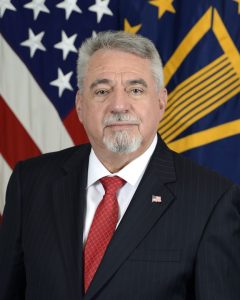
Dr. Daniel Ragsdale
Assistant Director for Cyber, OUSD (R&E), DoD
Dr. Daniel “Rags” Ragsdale is the Assistant Director for Cyber, in the Office of the Director of Defense Research and Engineering (Research & Technology). In that role, Dr. Ragsdale is responsible for coordinating cyber modernization efforts across the Department of Defense, with specific responsibility for the establishment of policies and for supervision over cyber modernization research and engineering, technology development, prototyping, experimentation, developmental testing, and transition activities. He is also responsible for making recommendations concerning the allocation of resources and alignment of efforts across the Department.
Before his recent return to service in the Department of Defense, Dr. Ragsdale was the founding director of the Texas A&M Cybersecurity Center and a Professor of Practice in the Department of Computer Science and Engineering. In the Director role, Dr. Ragsdale was responsible for leading, coordinating, and facilitating cybersecurity research and educational activities across the University. Dr. Ragsdale had previously served as a Program Manager in the Defense Advanced Research Projects Agency (DARPA). In that capacity, he successfully led and managed a $175M research and development portfolio of classified and unclassified cybersecurity and educational programs.
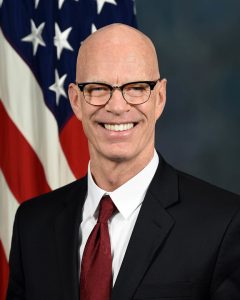
Dr. Michael Zatman
Assistant Director for Fully Networked C3, OUSD (R&E), DoD
Dr. Michael Zatman became the Assistant Director for Fully Networked Command, Control and Communications in the Office of the Under Secretary of Defense for Research and Engineering on January 22nd 2019. In that capacity Michael is responsible for leading the Nation’s vision and strategy for networking, command, control and communications to support and enhance the Department’s warfighting capability.
During his career Michael has provided both organizational and technical leadership to the creation, development and fielding of new technologies, the solving of complicated technical problems and the optimization of multi-faceted system and platform concepts. He is a nationally recognized expert in communications, radar, sensor and electronic warfare systems with an extensive knowledge and understanding of ground, sea, air and space based communications, intelligence, surveillance and reconnaissance systems.
Prior to joining the Office of the Undersecretary of Defense for Research and Michael was a fellow at SAZE Technologies from 2012 to 2018. From 2007 to 2012 Michael was Technical Director of QinetiQ North America’s Technology Solutions Group, where he was responsible for technical innovation and competency across a wide range of C4ISR, maritime and transportation projects. Additionally, he was the principal investigator for several new Navy, DARPA, IARPA and Air Force programs. Michael came to QinetiQ North America from DARPA where he spent four years as a Program Manager running programs and studies involving space, airborne and ground-based platforms, radar, communications, signal/electronic/communications intercept, optical sensors, multi-functional structures and quantum theory. Earlier in his career Michael worked at the MIT Lincoln Laboratory where he led multi-organizational & multi-disciplinary teams to design future surface radar, airborne radar and communications systems, developed signal processing algorithms and performed system engineering analysis for Air Force, Navy and MDA radar and communications systems.
Michael has authored over 65 technical publications, two book chapters and received multiple patents. Michael received his PhD and BEng (Hons – 1st Class) degrees from the University of Leeds and was awarded the Office of the Secretary of Defense Medal for Exceptional Public Service in 2007.
POSTERS: Incubator Projects
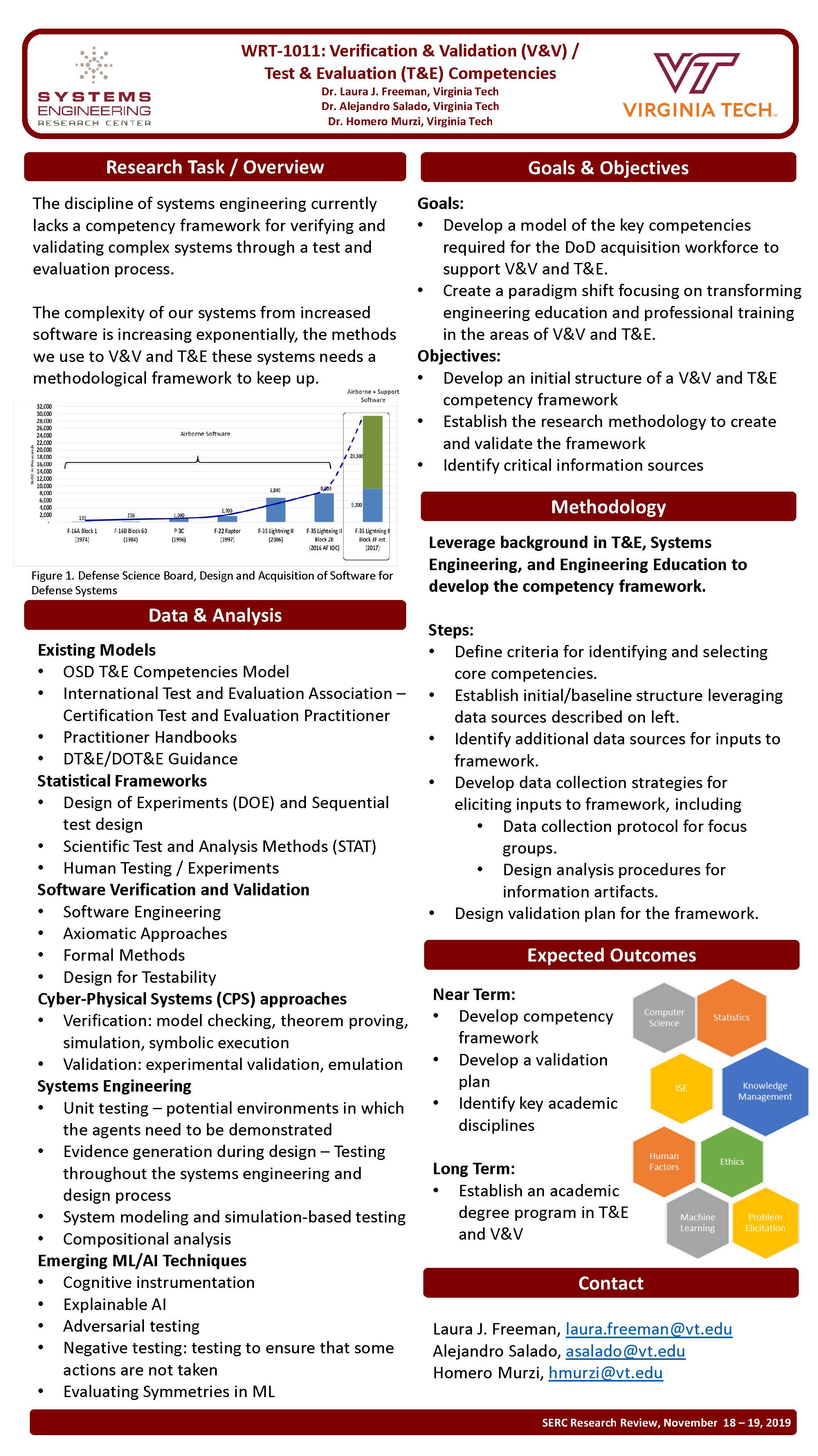
WRT-1011: Verification & Validation (V&V) / Test & Evaluation (T&E) Competencies
Dr. Laura J. Freeman, Dr. Alejandro Salado, Dr. Homero Murzi, Virginia Tech
VIEW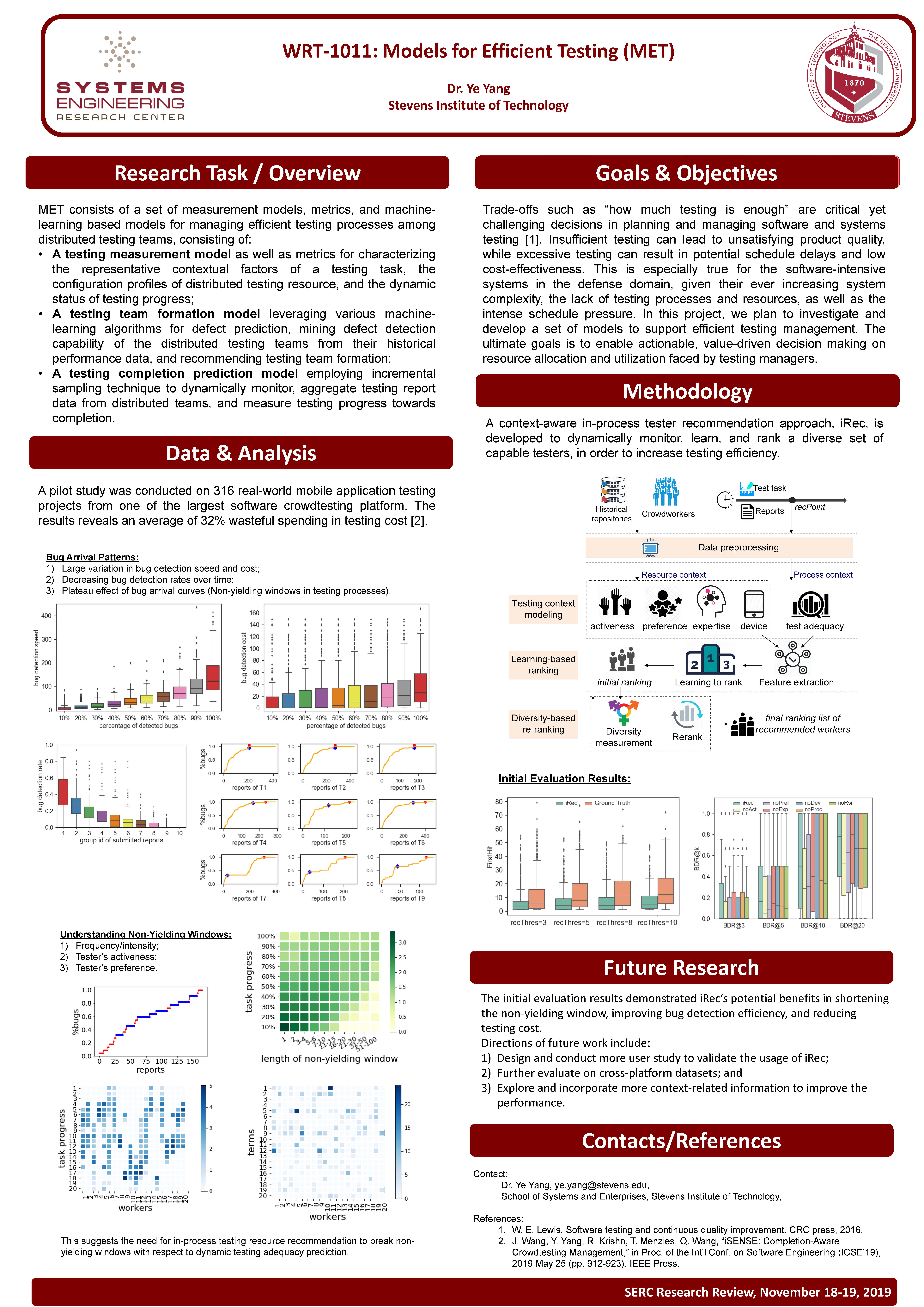
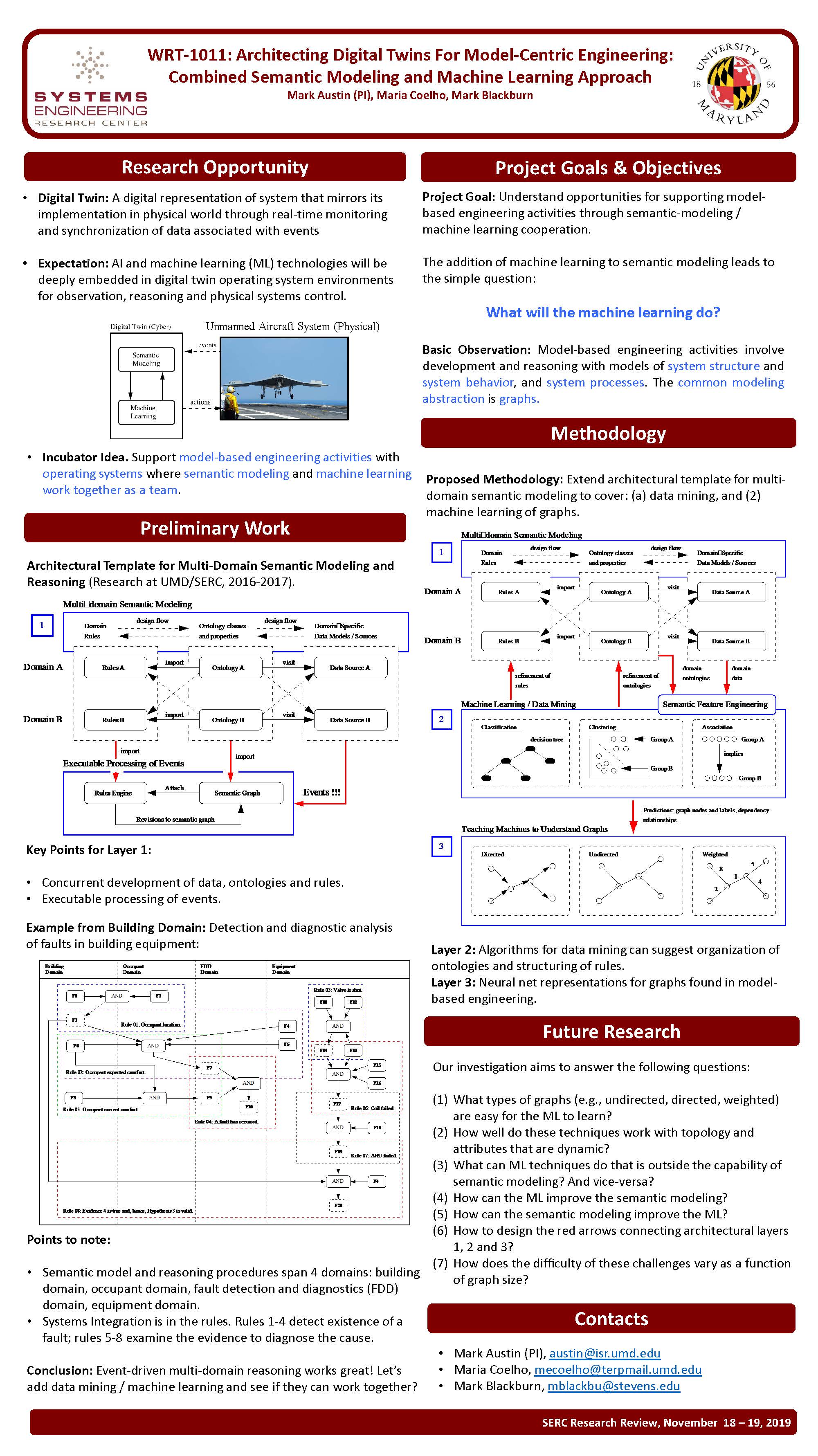
WRT-1011: Architecting Digital Twins For Model-Centric Engineering: Combined Semantic Modeling and Machine Learning Approach
Mark Austin (PI), Maria Coelho, Mark Blackburn
VIEW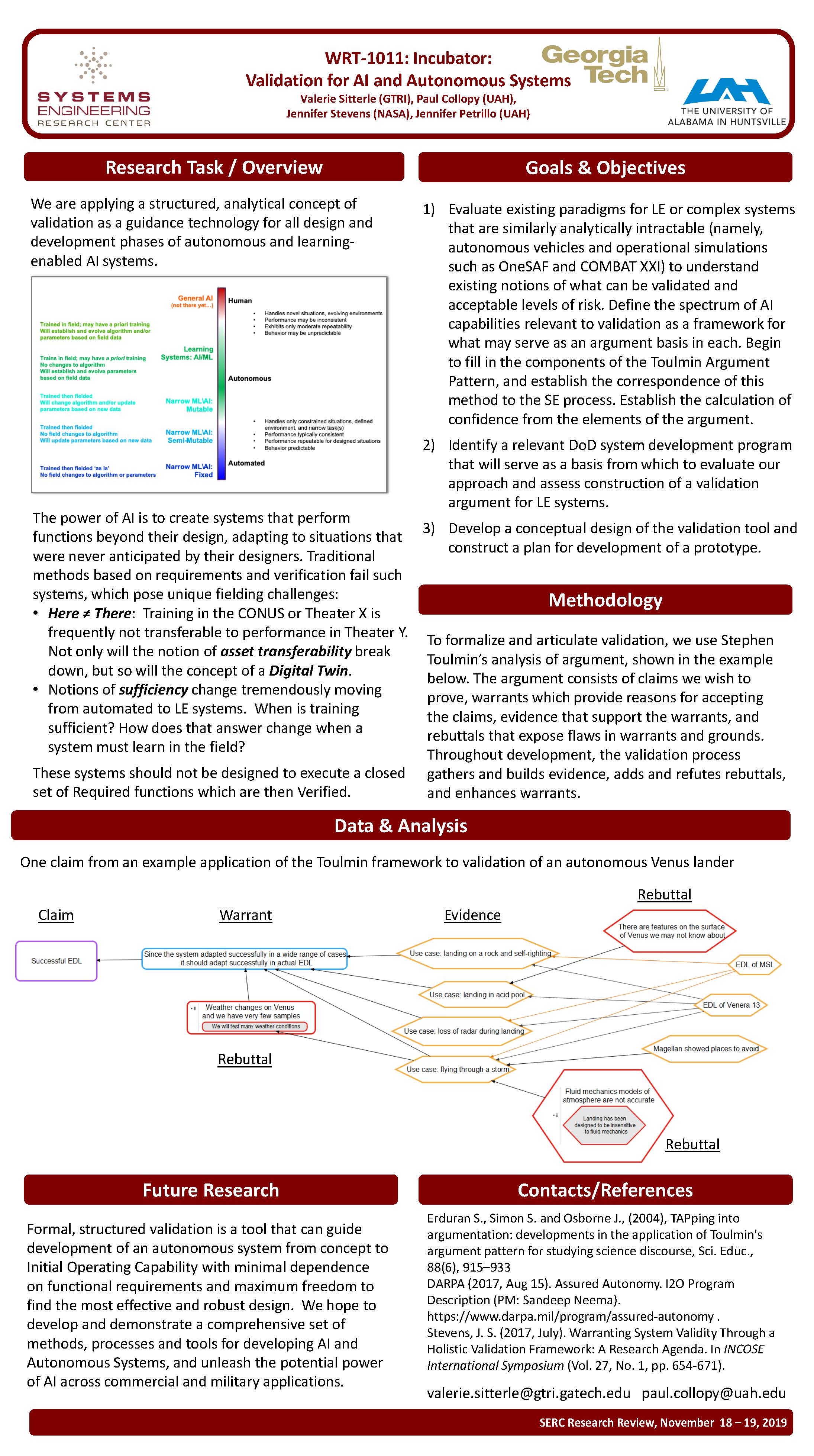
WRT-1011: Incubator: Validation for AI and Autonomous Systems
Valerie Sitterle (GTRI), Paul Collopy (UAH), Jennifer Stevens (NASA), Jennifer Petrillo (UAH)
VIEW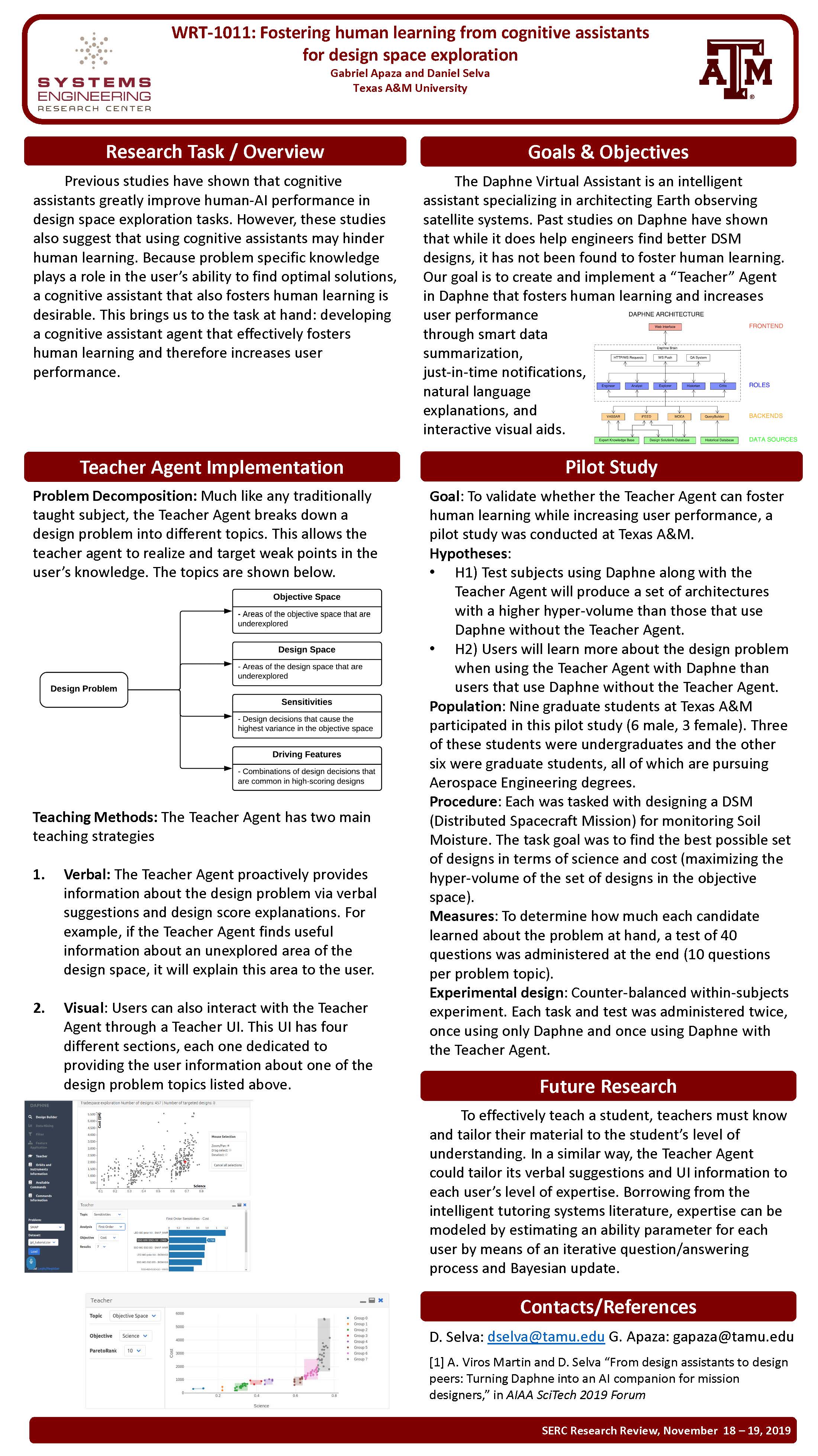
WRT-1011: Fostering human learning from cognitive assistants for design space exploration
Gabriel Apaza and Dr. Daniel Selva, Texas A&M University
VIEW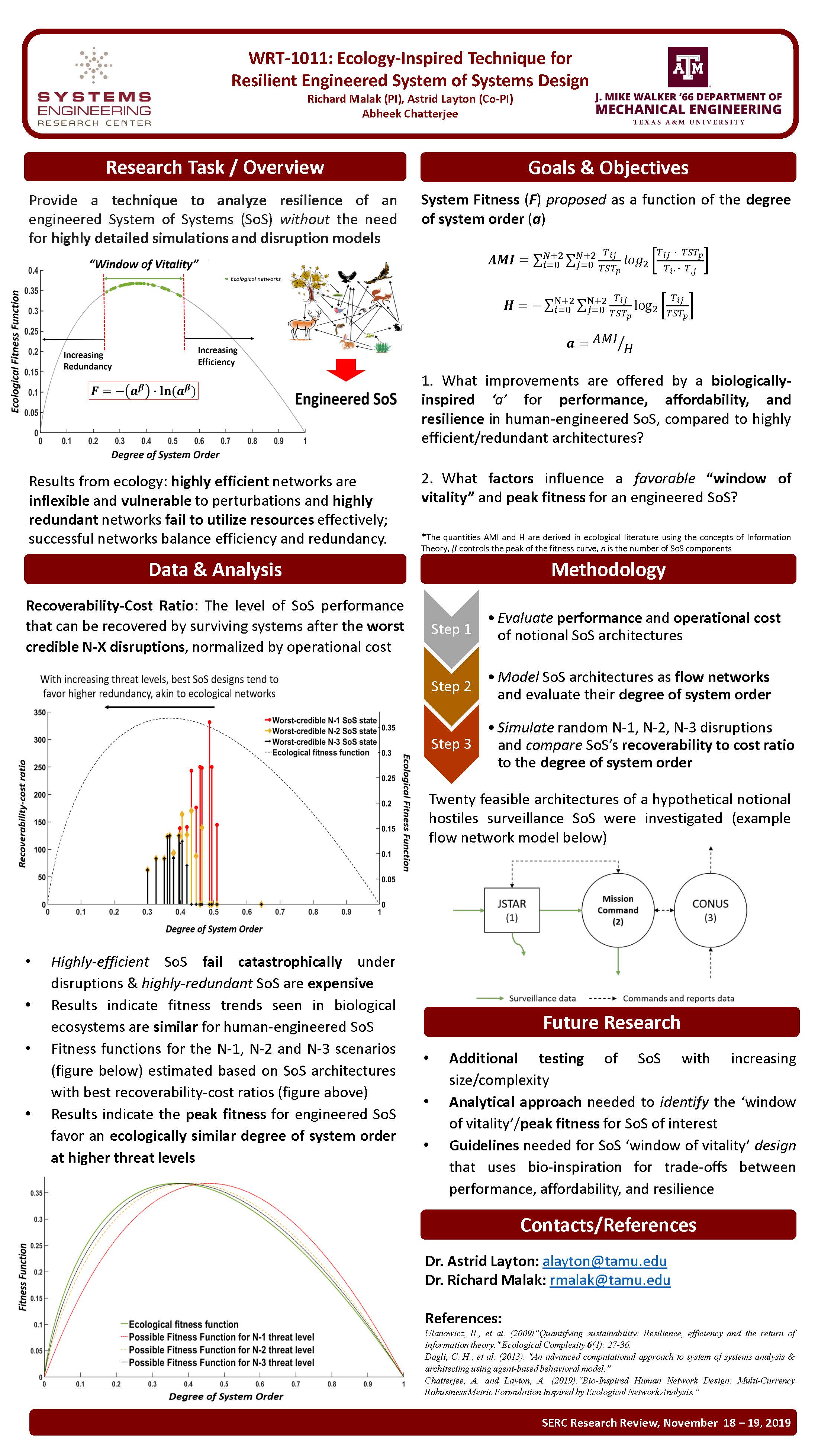
WRT-1011: Ecology-Inspired Technique for Resilient Engineered System of Systems Design
Richard Malak (PI), Astrid Layton (Co-PI), Abheek Chatterjee, Texas A&M University
VIEW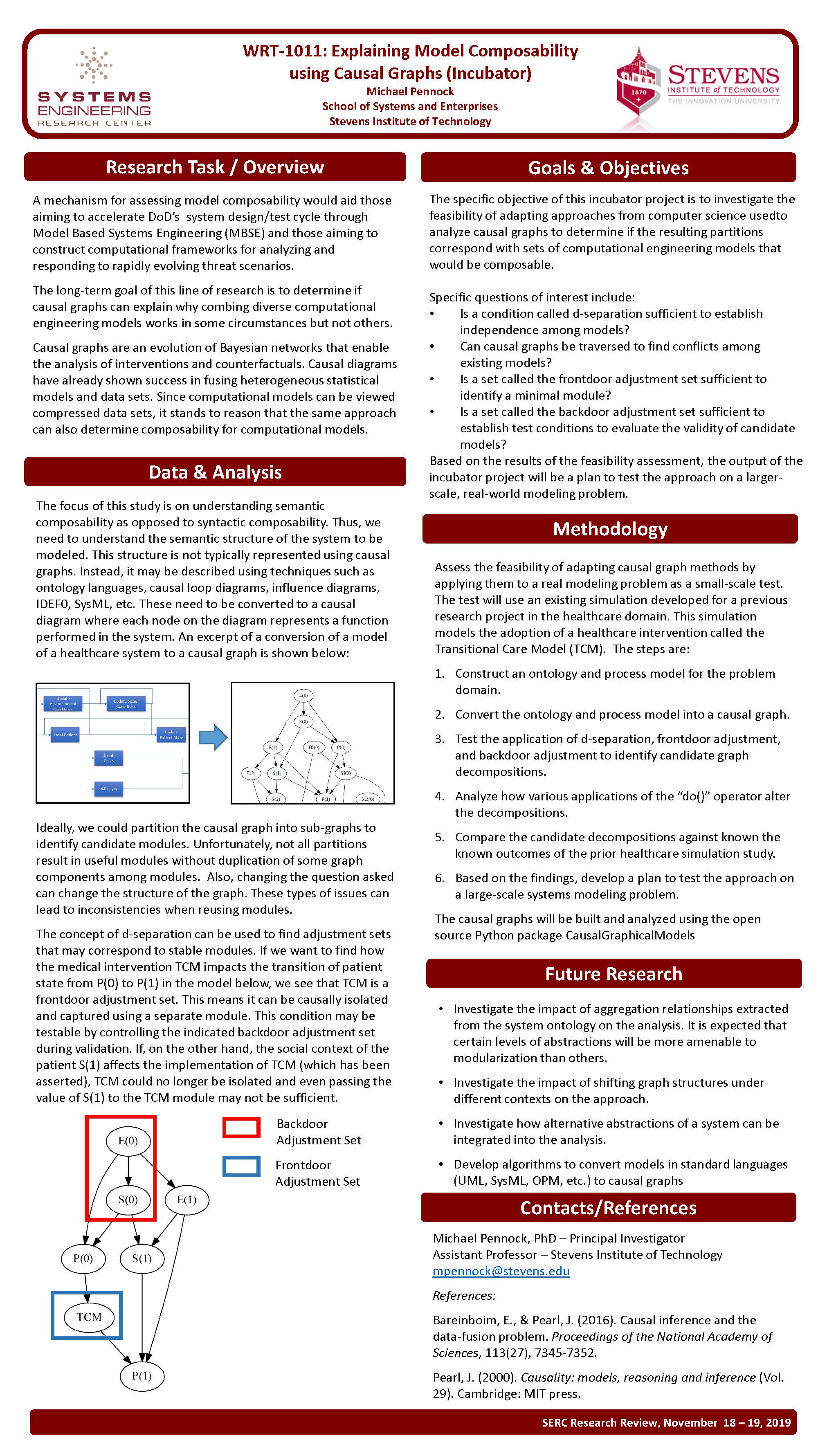
WRT-1011: Explaining Model Composability using Causal Graphs (Incubator)
Dr. Michael Pennock, School of Systems and Enterprises, Stevens Institute of Technology
VIEW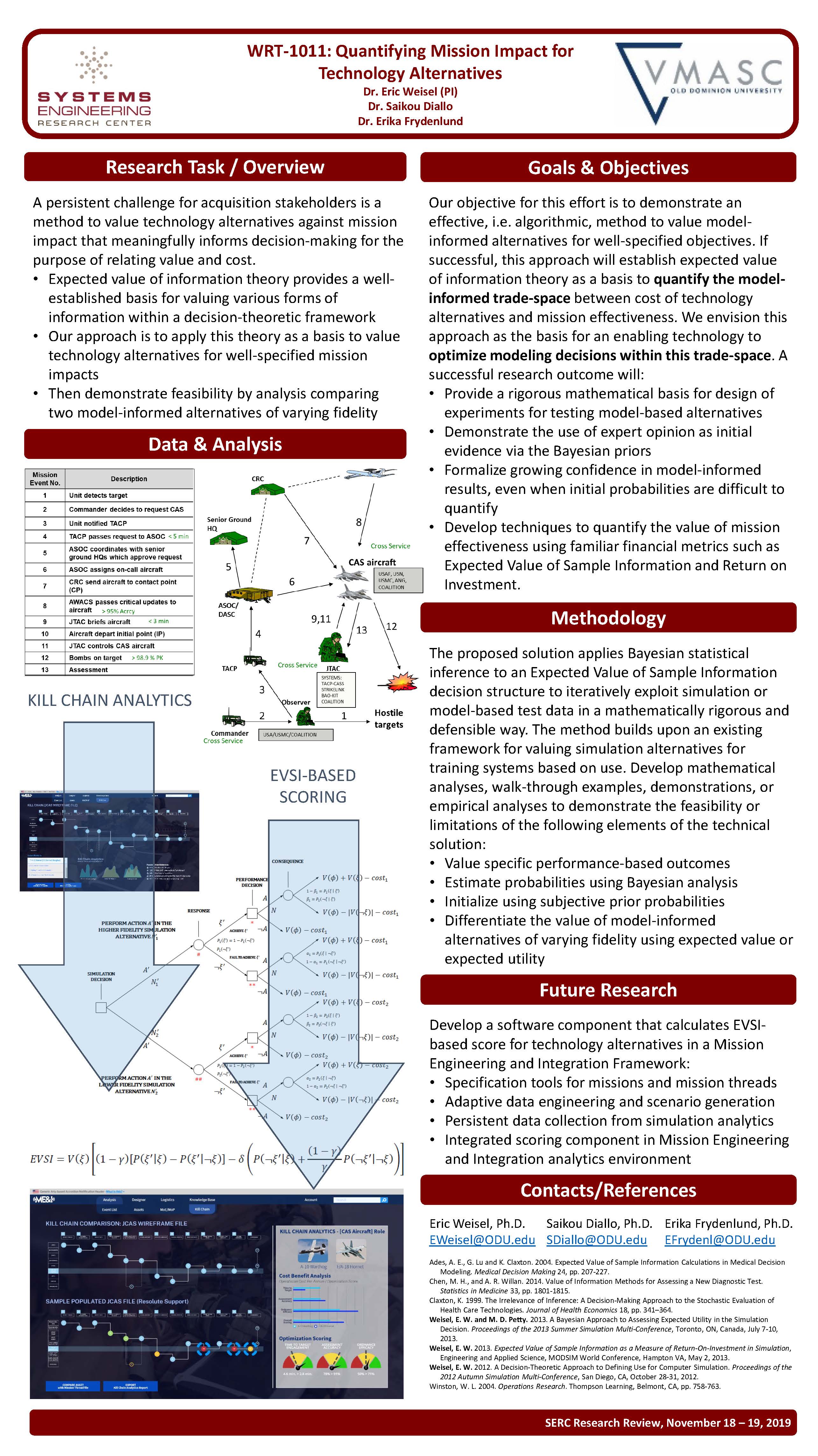
WRT-1011: Quantifying Mission Impact for Technology Alternatives
Dr. Eric Weisel (PI), Dr. Saikou Diallo, Dr. Erika Frydenlund, Old Dominion University
VIEWSystems Thinking Workshop / 7th Annual SERC Doctoral Students Forum
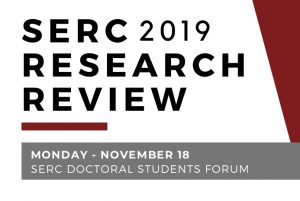
- Systems Thinking Workshop
10:00 am – 12:00 pm - SERC Doctoral Students Forum
12:30 pm – 6:00 pm
Washington, DC 20009
The SERC Doctoral Students Forum (SDSF) took place on day one of the two-day SERC Research Review, which provided an opportunity for doctoral students conducting highly relevant, systems engineering-related research at a SERC collaborating university to present their research in an open forum. This half-day session drives high impact by exposing the attendees to research that they may not have otherwise encountered. Students can present regardless of whether or not the research was conducted through a SERC initiative, which also provides our sponsors a view into research taking place throughout the SERC consortium.
To be considered to present at the SERC Doctoral Students Forum, a faculty member from one of the SERC Collaborating Universities nominated a doctoral student at the end of August 2019. The Best Student Presentation is awarded on the basis of potential impact, advancement to systems engineering, originality, technical content, and clarity of presentation at the conclusion of the Forum and announced at the SERC Sponsor Research Review the following day. Congratulations to this year’s winner, Tyler Cody from the University of Virginia. Mr. Cody will receive a trophy and a monetary grant.
Events are free to SERC Collaborators and Government participants; non-SERC Universities, FFRDCs, National Laboratories and Industry attendees are charged a nominal fee. A networking reception, open to all, with heavy hors d’oeuvres will follow the event at 6PM.
For more event information, please contact Ms. Monica Brito.
Expand the agenda below to view presentations inline/in box:
SystemiTool is a systems thinking method and tool for mapping complex systems using “Systemigrams.” This Systems Thinking Workshop introduced the newly updated SystemiTool, as well as a look back over the past 30 years at systems thinking and Systemigrams.
Opening Remarks: Dr. Jon Wade – SERC Chief Technology Officer
Workshop Lead: Dr. Brian Sauser – Professor, University of North Texas
| TIME | EVENT |
|---|---|
| 12:00 PM | LUNCH |
| 12:15 – 12:50 PM | Registration, Check-in, and Networking Time |
| 12:50 – 1:00 PM | Welcome and Introductions Dr. Dinesh Verma, Executive Director, SERC |
| 1:00 – 1:10 PM | Opening Remarks from the SERC Executive Sponsor D. Scott Lucero, SERC Program Manager, Acting Director, Engineering Policy and Systems, OUSD (R&E) |
| SERC DOCTORAL FELLOW & STUDENT PRESENTATIONS | ACADEMY HALL | |
| 1:15 – 1:45 PM | Modeling of Case Studies for What-if-Exploration with Different Assumptions Marilee J. Wheaton, Aerospace SERC Doctoral Fellow, University of Southern California Download Presentation |
| 1:45 – 2:10 PM | Reducing Design Rework using Set-Based Design Framework in a Model Centric environment during the Technology Maturation and Risk Reduction (TMRR) Phase of the Department of Defense (DOD) Acquisition Life Cycle Shawn Dullen, CCDC-AC, SERC Doctoral Fellow, Stevens Institute of Technology Download Presentation |
| 2:10 – 2:35 PM | Building the Case for Secure MOSA Using Systems Thinking Methodologies Giselle Bonilla-Ortiz, Raytheon SERC Doctoral Fellow Download Presentation |
| 2:35 – 3:00 PM | A Systems Theoretic Approach to the Design of Systems with Learning Algorithms Tyler Cody, Doctoral Student, University of Virginia Download Presentation |
| 3:00 – 3:40 PM | BREAK |
| 3:40 – 4:05 PM | Identifying Collaboration and Communication Needs for Complex Systems Design using Digital Engineering Stephanie Chiesi, Raytheon SERC Doctoral Fellow Download Presentation |
| 4:05 – 4:30 PM | The Impact of Software Security Practices on Development Effort Elaine Venson, Doctoral Student, University of Southern California Download Presentation |
| 4:30 – 4:55 PM | Reliability Engineering of Autonomous Systems incorporating Machine Learning Christian Ellis, Doctoral Student, University of Massachusetts Amherst Download Presentation |
| 4:55 – 5:20 PM | Efficient Multidisciplinary System Design Optimization at the Mission Level Brian Chell, Doctoral Student, Stevens Institute of Technology Download Presentation |
| * | [Due to illness, Major Russell Shirey was unable to attend/present his submitted presentation.] Characterizing Unmanned Aerial Systems (UAS) networks and Implications for sensor end-to-end applications Major Russell Shirey, AFRL SERC Doctoral Fellow, Purdue University Download Presentation |
| 5:20 – 5:30 PM | BREAK |
| 5:30 – 6:00 PM | SDSF KEYNOTE ADDRESS Dr. Wouter Leibbrandt, Science and Operations Director of ESIDownload Presentation |
| 6:00 – 7:30 PM | PI 101 | EVENING RECEPTION |
Dr. Wouter Leibbrandt
Science and Operations Director of Embedded Systems Innovation by TNO (Toegepast Natuurwetenschappelijk Onderzoek / Netherlands Organisation for Applied Scientific Research)
Wouter Leibbrandt is Science and Operations Director of Embedded Systems Innovation (ESI), an industry and academia sponsored research center hosted by TNO. ESI focusses on the development of novel methodologies, often model-based, for design and engineering of increasingly complex high-tech (embedded) systems. It does so in strong partnership and close collaboration with leading high-tech companies such as ASML, Philips, Thales, NXP, Océ, Thermo-Fisher and Nexperia as well as with leading academic groups in the Netherlands and across Europe. Themes are: digital twin, big data in high-tech systems, impact of AI and systems of systems.
Until early 2016 Wouter was with NXP Semiconductors for 10 years, where he managed the Advanced Applications Lab, investigating new application concepts around future advanced silicon products, driving secure connections for a smarter world. Before joining NXP, he was with Philips Research labs for 14 years, managing a variety of projects and departments. From 2004 to 2006 he lived and worked in China, at the Philips Research labs in Shanghai.
He serves in advisory roles to several academic departments and curricula and is on the steering board of the European ARTEMIS Industry Association. Wouter holds a PhD in physics from Utrecht University.
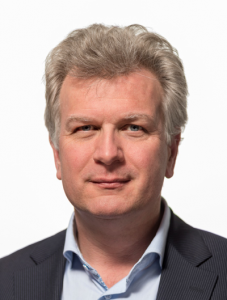
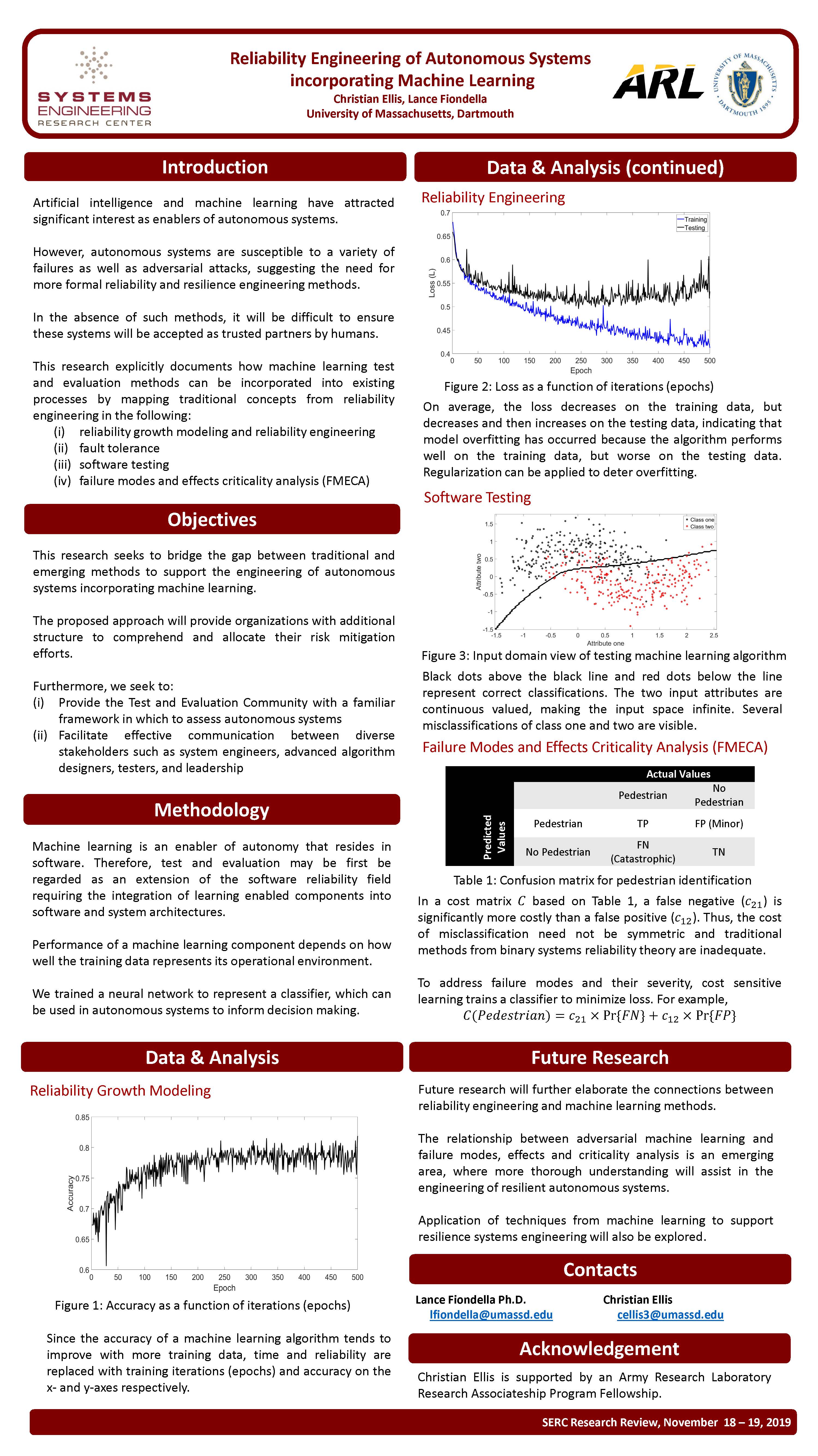
Reliability Engineering of Autonomous Systems Incorporating Machine Learning
by Christian Ellis, Lance Fiondella, University of Massachusetts - Dartmouth
View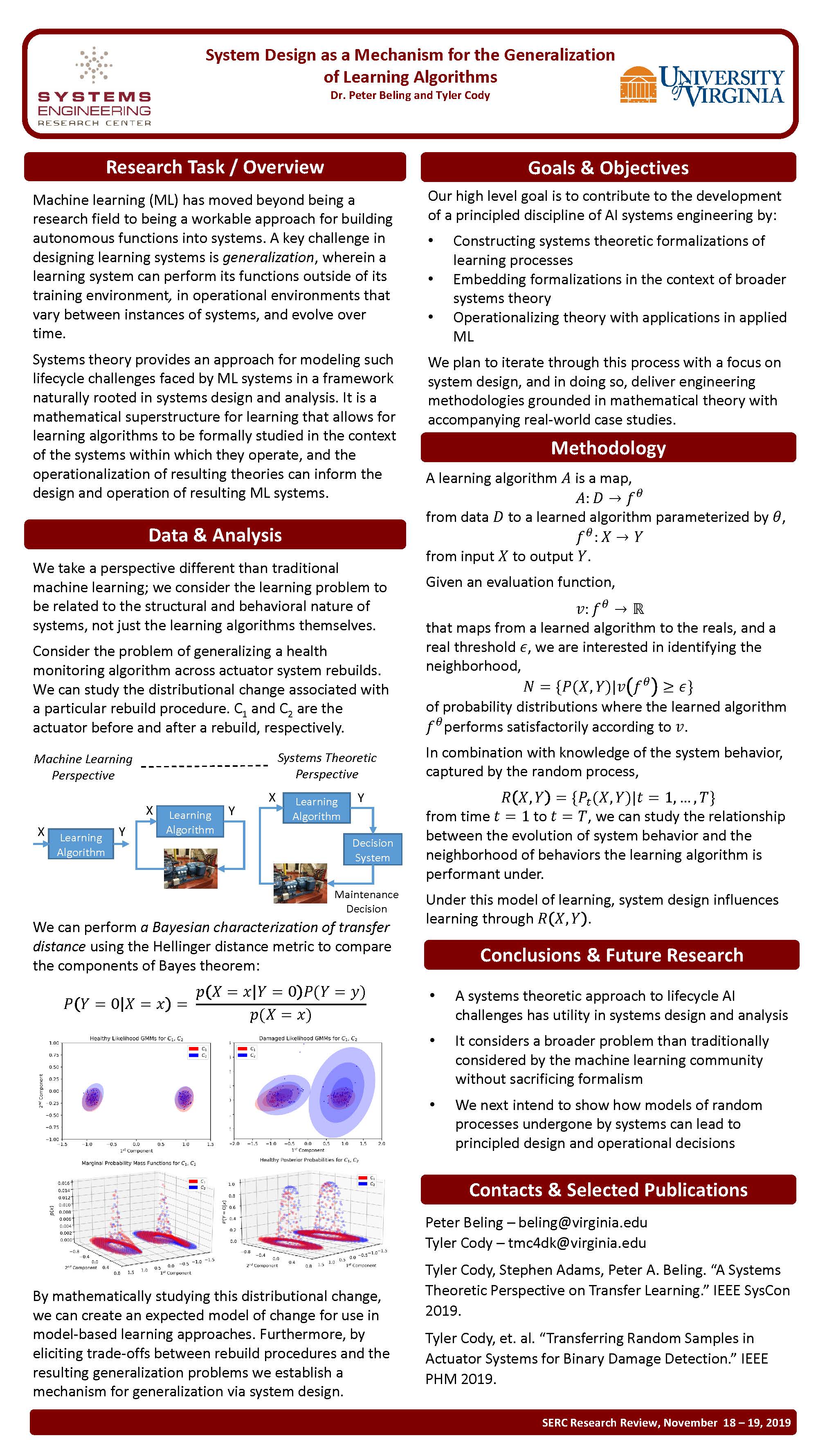
System Design as a Mechanism for the Generalization of Learning Algorithms
by Dr. Peter Beling and Tyler Cody, University of Virginia
View
Efficient Multidisciplinary System Design Optimization at the Mission Level
by Brian Chell, Ph.D. Candidate, Systems Engineering Advisor: Steven Hoffenson
View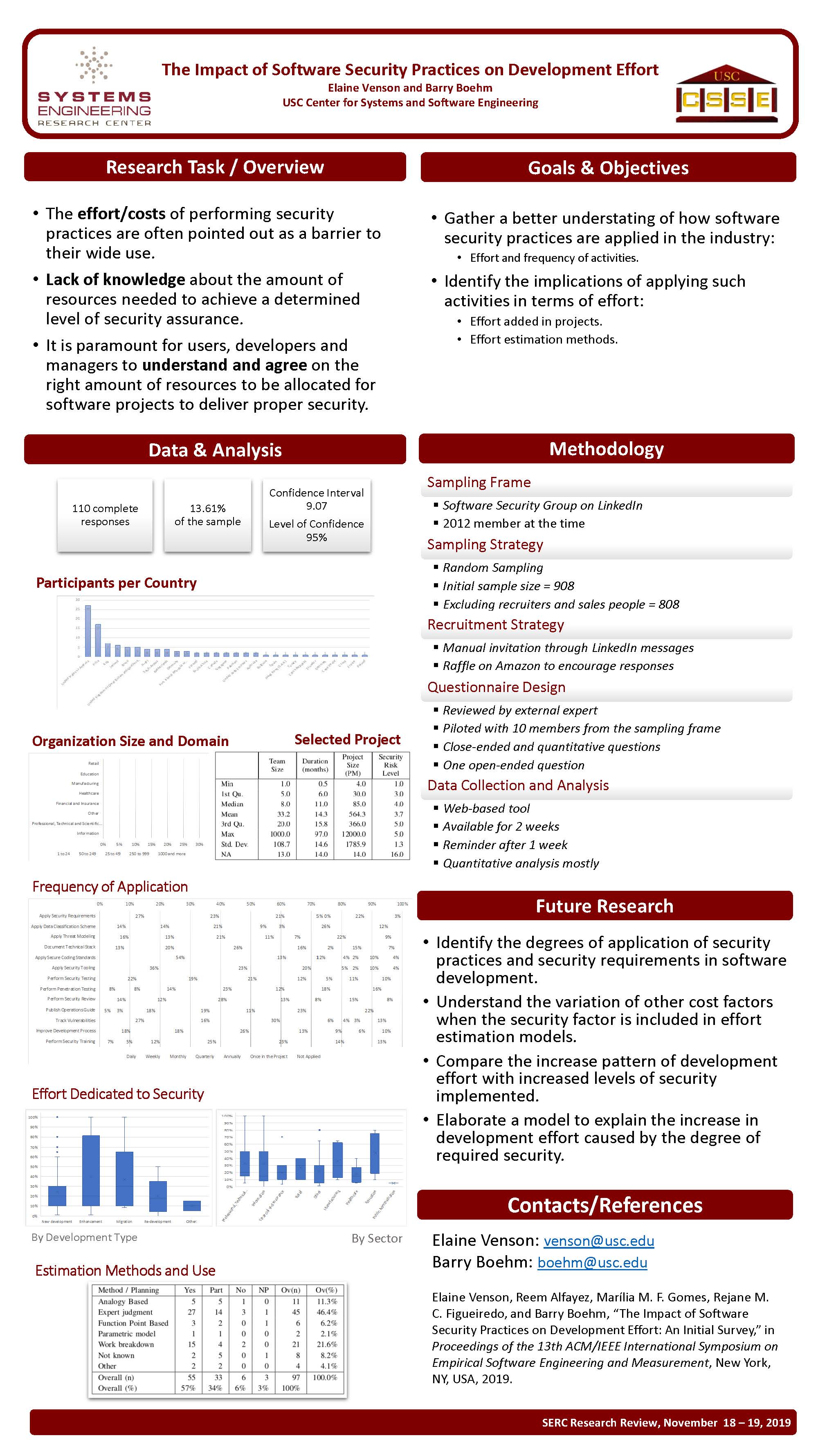
The Impact of Software Security Practices on Development Effort
by Elaine Venson and Barry Boehm, USC Center for Systems and Software Engineering
View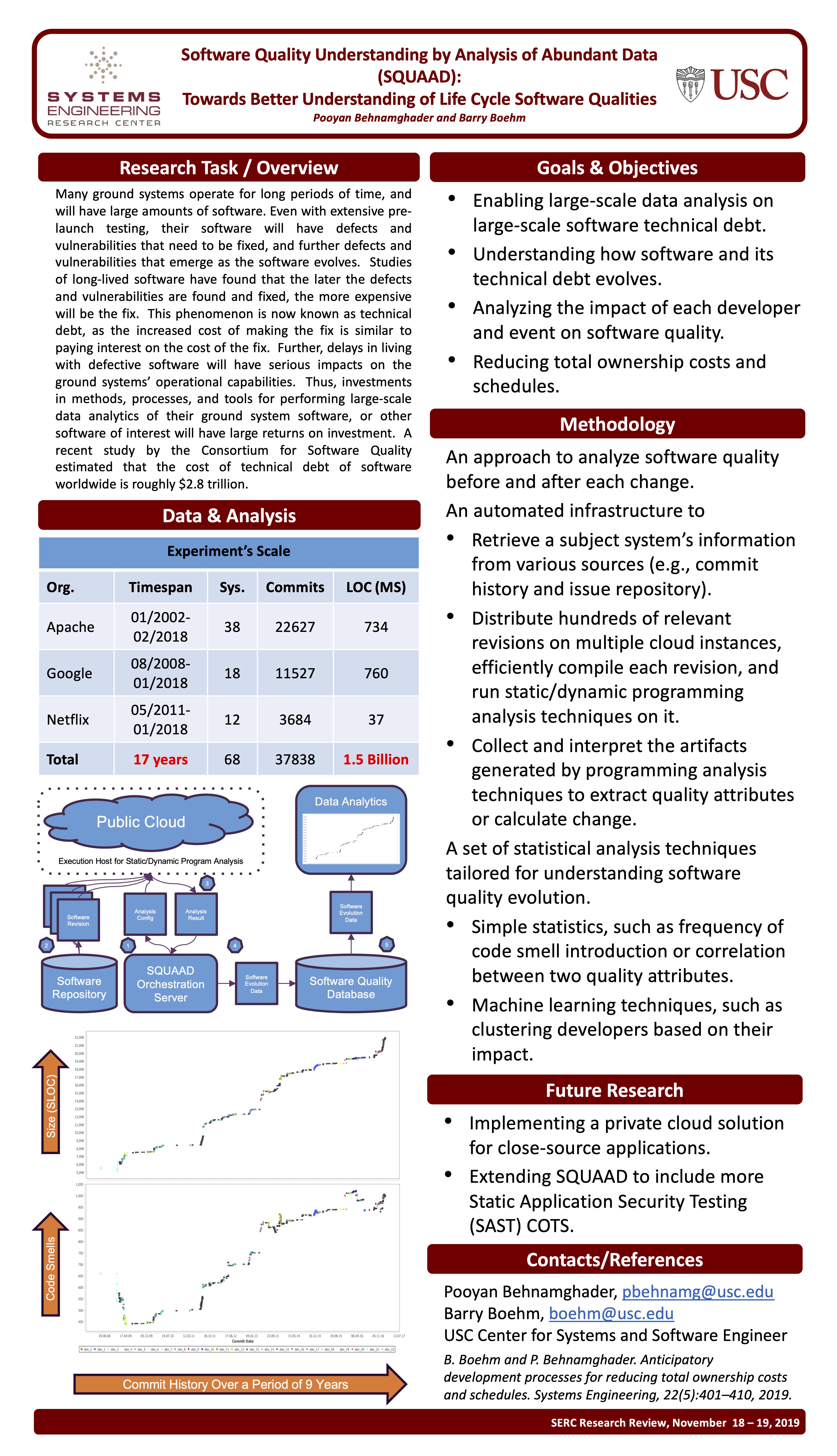
Software Quality Understanding by Analysis of Abundant Data (SQUAAD): Towards Better Understanding of Life Cycle Software Qualities
by Pooyan Behnamghader and Barry Boehm, USC
ViewNDIA’s 22nd Annual Systems and Mission Engineering Conference
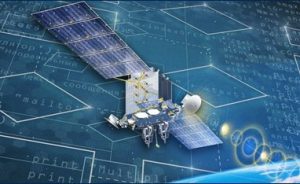 This is the 22nd year that National Defense Industrial Association has sponsored this event in conjunction with the Department of Defense. This conference will focus on improving acquisition and performance of Defense programs and systems, including system – of – systems engineering, systems security, net-centric operations and data/information interoperability, and all aspects of system sustainment. This conference is sponsored by the National Defense Industrial Association, Systems Engineering Division, in cooperation with IEEE Aerospace and Electronic Systems Society, IEEE Systems Council and the International Council on Systems Engineering, and is supported by the Office of the Deputy Assistant Secretary of Defense for Systems Engineering in the Office of Under Secretary of Defense for Research & Engineering.
This is the 22nd year that National Defense Industrial Association has sponsored this event in conjunction with the Department of Defense. This conference will focus on improving acquisition and performance of Defense programs and systems, including system – of – systems engineering, systems security, net-centric operations and data/information interoperability, and all aspects of system sustainment. This conference is sponsored by the National Defense Industrial Association, Systems Engineering Division, in cooperation with IEEE Aerospace and Electronic Systems Society, IEEE Systems Council and the International Council on Systems Engineering, and is supported by the Office of the Deputy Assistant Secretary of Defense for Systems Engineering in the Office of Under Secretary of Defense for Research & Engineering.
This conference seeks to create an interactive forum for Program Managers, Systems Engineers, Chief Scientists, and Engineers and Managers from the Requirements, Design, Verification, Support, Logistics and Test communities from both Government and Industry. The conference will provide the opportunity to shape policy and procedures by exchanging innovative tactics and lessons learned.
NDIA’s Annual Systems and Mission Engineering Conference will explore the various roles of systems engineering from all aspects and perspectives—pragmatic, practical and academic—and will bring together key practitioners to work on effective solutions to achieve a successful and affordable warfighting force.
Topics:
- Mission Anlaysis
- Modeling Simulation
- Software Experts Panel
- Systems Architecture
- Systems of Systems Engineering
- Systems Security Engineering
Hotel Information
Hilton Tampa Downtown | 211 N. Tampa Street | Tampa, FL 33602
A block of rooms has been reserved at the Hilton Tampa Downtown. The group rate is $179 for Industry and $121 for Government. Be sure to make your reservation by the cutoff date of Friday, September 27, 2019, to lock in the group rate. Visit the event website to book your room now!

